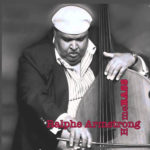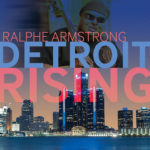Proud Detroiter talks bass collection, technique tips, and upcoming record
Exclusive interview with FBPO’s Jon Liebman
August 5, 2019
Ralphe Armstrong is a world-class virtuoso of the upright and electric bass, as well as a passionate music educator. The Detroit native got an early start on his career when he was hired by John McLaughlin to perform in the Mahavishnu Orchestra, while Armstrong was still a teenager. After Mahavishnu, Ralphe went on to perform with Frank Zappa, Jean-Luc Ponty, Carlos Santana, James Carter, Eddie Harris, Lenny White, and many others, including the London Symphony Orchestra. Armstrong’s solo releases include the acclaimed HomeBASS and Detroit Rising. He is currently working on his next major project with Narada Michael Walden and several other musicians.
FBPO: The last interview we did was about three and-a-half years ago. It was at the NAMM show 2016, right after Detroit Rising came out.
Ralphe: That’s right!
FBPO: The interview before that, we did in Germany, in 2014.
Ralphe: Mmm hmm…
FBPO: And the first one we did was published in August of – are you ready for this – 2010.
Ralphe: Wow!
FBPO: So, we’ve got some catching up to do. Tell me what’s going on. Don’t you have another new recording?
Ralphe: No, I’m working on one now. I’m going to do a recording with Narada Michael Walden. It’s time we did a new project. And, I touched base with an old friend of mine who’s a producer also, Kamau Kenyatta. He’s the producer of Gregory Porter. We’re going to do a mixture of music. It’s time to do something.
FBPO: Who else is going to be on it?
Ralphe: I’m gonna use Gayelynn McKinney, Carlos McKinney, and Regi Wooten again, Victor Wooten’s brother. We just got back from Australia.
FBPO: Do you have a title for the new record?
Ralphe: Not yet. I’m working on that. It’ll be something about my life. I don’t know yet. I don’t really want to say just yet.
FBPO: When can we expect to see it released?
Ralphe: Next July. It’s gonna take a year. See, it takes time to do a recording, if you want it to be good. And I also hope to have Bennie Maupin play on it too. We played together last year at the (Detroit) jazz festival. He’s from Detroit, you know. Detroit icon. There are so many musicians from Detroit that people don’t even know about. I mean all genres. You’d be surprised.
FBPO: What else is keeping you busy?
Ralphe: Oh, teaching. I’ve been subbing at the University of Michigan for Bob Hurst when he’s out of town.
FBPO: Is he still with Diana Krall?
Ralphe: Diana Krall, yep. And then also, I teach at Cass Tech High School two days a week.
FBPO: What about playing, performing live? Didn’t you just do a show at “The Aretha” in Detroit not too long ago?
Ralphe: That’s right! I had my group. I have two groups. I have the ID Band, that’s the International Detroiters. I had James Carter in the band, Evan Garr from Stanley Clarke’s band on violin, Gerard Gibbs, who plays with James Carter, on keyboard, and also Gayelynn McKinney. I had Trenita Womack, from The Funk Brothers, on the congas, and Delbert Nelson from The Funk Brothers, singing, and Paul Kramer on guitar.
FBPO: What about the other band?
Ralphe: The other band, that’s The Fusion Reunion. I use Rick Margitza, Carlos McKinney, Gayelynn McKinney, and Regi Wooten. That’s the group I’ve been going overseas with.
FBPO: Tell me about your gear. I know you’re a longtime Warwick guy.
Ralphe: Oh, man. It’s a funny thing. I have two inexpensive basses from Warwick, and they’re two of my favorite basses. I have a yellow Corvette, and that’s a 5-string, and I have a sunburst Corvette that’s fretless. And they weigh nothing. A lot of the Warwicks are very heavy because of the exotic wood that he uses.
FBPO: Like the Jonas Hellborg bass? That thing weighs about 40 pounds!
Ralphe: Right, I know, thank you very much. I got some basses, man, if I hit somebody, they’d be in the emergency room.
FBPO: [Laughs]
Ralphe: Seriously! But they’re works of art. I have a 6-string Streamer. It’s flame red curly maple. I’ve got a 4-string custom made Streamer with an ebony fingerboard that’s fretted. I have a 5-string Streamer that’s bubinga, with a blonde maple neck on it. I have a tiger wood maple bass with an ebony fingerboard, that’s a 5-string. I have a 5-string Star bass, made out of bubinga. Those are like the B.B. King model, you know, like a 335? And I’ve got a 6-string Thumb bass, fretless. I used that when I was with Larry Coryell, ‘cause it sounds like a bass violin almost. It’s got a huge fingerboard, something like Anthony Jackson’s bass. And I’ve got like four other basses. I’ll have to go in there and look.
FBPO: I assume the 5-strings have low B strings on them, right?
Ralphe: Oh yeah. They’re all low B, definitely. Yep. And I have an Alien 4-string acoustic bass by Warwick.
FBPO: I don’t think I’m familiar with that model.
Ralphe: Yeah, it’s a weird-lookin’ thing, and it sounds like a fiddle.
FBPO: What kind of strings do you use?
Ralphe: I’ve been using DR strings. But lately, Stanley Clarke and Doug Wimbish got me into the Rotosounds, which I’ve been digging lately.
FBPO: How about amps?
Ralphe: I was with Hartke for ten years. I still have some of their amplifiers, but I’m using Aguilar. I’m also using a custom rig I really like. It was built for me by Mesa. Man, that thing is unbelievable. I mean I like the Aguilar too now, and I like the Hartke, but that damn Mesa, oh my god, it is no joke!
FBPO: What about effects?
Ralphe: I’ve been using Digitech for the last 30 years. I’m a big Digitech fan.
FBPO: Let’s talk about bass technique. Now that FBPO is also offering online lessons, what advice can you impart to our members who want to learn bass?
Ralphe: One thing that’s definitely missing is the left-hand technique. That’s paramount. Discipline with the left hand. If you keep your second finger and your thumb in line, you can make a better sound with the bass. And it’s been done, with James Jamerson, Ron Carter, Jaco… It’s the touch. The left hand is paramount in getting the sound of the instrument.
FBPO: It’s interesting that you say that, because I’ve always thought people concentrate more on the left hand than the right hand. In fact, when I was in the Warwick showroom in Germany, Victor Wooten came up to me started showing me some stuff. He said, “Remember, anything the left hand can do, the right hand can do.” It was like a revelation! We were talking about two-handed tapping and stuff, but the point is still relevant.
Ralphe: Well, see, I love Victor. That’s a different concept of playing the bass. The thing about the two hands is great, but the thing about the left hand, and when you’re playing an instrument that’s fretless, your technique is exposed. When I say exposed, that means that you have to have technique to have good intonation, to play a B in tune, an E, A-flat in tune. And you either use the ball or the tip of the finger to get the note to sound like a note. That’s what Jamerson taught me, to play musical, to get your sound. But if you don’t have technique, you’re gonna play out of tune on a fretless instrument.
FBPO: What about using the upright fingering on the electric?
Ralphe: That’s what I do!
FBPO: You go 1-2-4, when you’re down in the lower register?
Ralphe: Yes, always! So did Jamerson!
FBPO: What about when you get up to what would be “thumb” position?
Ralphe: Well, no. What happens when you get up to 7th position, where the G harmonic is, you eliminate the fourth finger and use the third and then you go 1, 2, 3, and you can use the thumb if you want to go G, A, B, and C.
FBPO: Do you use your thumb like that on the electric bass?
Ralphe: No. Sometimes if I want to show off, I’ll do it. [Laughs]
FBPO: Leave that to Steve Bailey and Brian Bromberg.
Ralphe: Yeah! I know both of them cats. [Laughs]
FBPO: What else do you have coming up, other than the projects you mentioned?
Ralphe: Right now, I’m relaxing. I need a little break. I flew 51,842 miles last year, and I’m burned out. I’m going to NAMM, I’m going to work on this music, and I’m relaxing.
See Jon’s blog, with key takeaways from this interview, here.
HomeBASS and Detroit Rising are available in the FBPO store:














One of the WORLD’S GREATEST BASSIST.
Ralphe is definitely one of the greatest bassists that have ever lived! He is one of the few virtuosos on both upright and electric bass. It’s insane that Ralphe Armstrong is not on the Bass Player magazine 100 greatest bassists! That’s blasphemy!